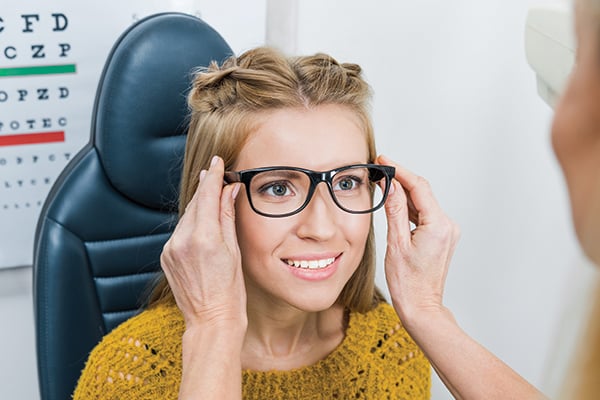Caring for your eyes
Taking care of your eyes is crucial for overall health and quality of life. Whether you’re looking for tips to keep your eyes healthy or need help locating an ophthalmologist or optometrist, we’re here to help you every step of the way.

Tips for good eye health
Maintaining your eye health is vital for overall well-being. Here are some tips to keep your eyes healthy:
- Get regular eye exams to detect problems early. All WellSense plans offer routine eye exams.
- If prescribed glasses, wear them frequently. Some WellSense plans offer discounts on eyeglasses.
- Wear sunglasses with UV protection.
- Eat a balanced diet rich in nutrients like omega-3 fatty acids, lutein, zinc, and vitamins C and E.
- Reduce screen time and take regular breaks while using computers or smartphones. Consider using blue-light blocking glasses for extended screen use.
- Use proper lighting when reading or working.
- Protect your eyes from injury by wearing protective eyewear during sports or hazardous activities.
- For dry eyes, use artificial tear drops or try adding moisture to the air with a humidifier.
- Avoid smoking, which can increase the risk of age-related eye diseases. If you need help to stop smoking, Massachusetts WellSense members can ask their doctor to refer them to QuitWorks and New Hampshire WellSense members can call QuitNow NH at 800-QUIT-NOW.
Protect your eyes
- Get regular eye exams to detect problems early. All WellSense plans offer routine eye exams.
-
A diabetic eye exam is important for members with diabetes. It is a simple, painless part of a routine eye exam that helps detect or prevent diabetic retinopathy—a serious complication of type 1 or type 2 diabetes that can lead to vision loss or blindness.
- If prescribed glasses, wear them frequently. Some WellSense plans offer discounts on eyeglasses.
- Protect your eyes from injury by wearing protective eyewear during sports or hazardous activities.
Monitor your environment
- Reduce screen time and take regular breaks while using computers or smartphones.
- Consider using blue-light blocking glasses for extended screen use.
- Wear sunglasses with UV protection.
- Use proper lighting when reading or working.
More tips
- Eat a balanced diet rich in nutrients like omega-3 fatty acids, lutein, zinc, and vitamins C and E.
- For dry eyes, use artificial tear drops or try adding moisture to the air with a humidifier.
- Avoid smoking, which can increase the risk of age-related eye diseases. If you need help to stop smoking, find resources here.
Vision warning signs to watch for
Early detection of these symptoms are essential for maintaining good eye health and preventing diseases such as cataracts. If you’re experiencing any of these symptoms, contact your eye doctor as soon as you can for an eye exam.
- Blurry/hazy vision
- Squinting or difficulty focusing on objects
- Headaches caused by eye strain
- Eye irritation, dry eye or eye pain
- Peripheral (side) vision loss
- Tunnel vision
- Sensitivity to light or glare
- Difficulty adapting to low light

- Blurry/hazy vision
- The need to squint to see clearly
- Headaches caused by eyestrain
- Difficulty focusing on objects
- Eye irritation or pain
- Sensitivity to light or glare
- Peripheral (side) vision loss
- Tunnel vision
- Difficulty adapting to low light
Take your medicines as prescribed
- Know exactly how and when to take your medications.
- Take your meds on time. Use notes or a smartphone app.
- Have your medication with a small meal or snack to avoid side effects.
- You may need to take the medications for a long time.
- Talk to your doctor before stopping medications.
Fill your medications on time
- Set up automatic refills or refill reminders at your pharmacy,
- Consider using our mail order pharmacy to get a three month supply of medications mailed to your home. Contact Cornerstone Health Solutions at 844-319-7588 to get started.
Monitor your blood sugar levels
- Blood sugar testing shows how well your medications are working or how your food intake, exercise or illnesses are affecting your blood sugar levels.
- Check blood sugar levels using a blood glucose meter. Follow your doctor’s advice on how often you need to check your blood sugar level. Keep a record of your levels to discuss with them.
- If you take insulin, check your blood sugar before meals and snacks as well as before and after exercise.
Know your target blood sugar range
The American Diabetes Association recommends the following target blood sugar levels:
- Before meals: 80-130mg/dl
- Two hours after meals: Less than 180mg/dl
WellSense vision benefits
All WellSense plans provide routine, preventive vision exams. Some offer eyeglasses (lenses and/or frames), contact lenses, and additional vision services. See your plan documents below for more details.
| Plan | Preventive | Lenses/Frames/Contacts | Vision services |
| Clarity |
|
|
|
| MassHealth |
|
|
|
| Senior Care Options |
|
|
|
| New Hampshire Medicaid |
|
|
|
| New Hampshire Medicare Advantage |
|
|
|
WellSense vision benefits
All WellSense plans provide routine, preventive vision exams. Some offer eyeglasses (lenses and/or frames), contact lenses, discounts and additional vision services. See your plan documents below for more details.
Find an eye doctor
Our network includes experienced eye doctors who provide personalized care. Use our provider locator to find an eye doctor, ophthalmologist or optometrist in your plan’s optical network.

Find an eye doctor
Our network includes experienced eye doctors who provide personalized care. Use our provider locator to find an eye doctor, ophthalmologist or optometrist in your plan’s optical network.
Helpful resources
You are leaving the WellSense website
You are now leaving the WellSense website, and are being connected to a third party web site. Please note that WellSense is not responsible for the information, content or product(s) found on third party web sites.
By accessing the noted link you will be leaving our website and entering a website hosted by another party. Please be advised that you will no longer be subject to, or under the protection of, our privacy and security policies. We encourage you to read and evaluate the privacy and security policies of the site you are entering, which may be different than ours.